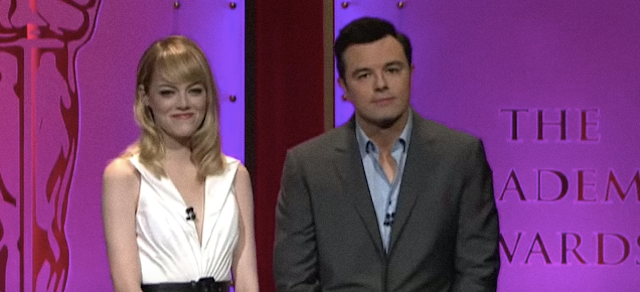Seth MacFarlane Made a Pointed Joke About Harvey Weinstein Back in 2013

https://www.youtube.com/watch?v=KCNvREKTnQc
During the announcement of 2013’s Oscar nominees for Best Supporting Actress, MacFarlane took a crack at Harvey Weinstein that shows how much of an “open secret” Weinstein’s behavior was.
As he announced the nominees with Emma Stone at his side, MacFarlane wrapped up that segment by saying, sharply, “Congratulations, you five ladies no longer have to pretend to be attracted to Harvey Weinstein.”
This “joke” is met by immediate—if somewhat nervous—laughter from the room. The context is that the award nomination was bound to be such a boost to the nominees’ career that they would not have to yoke their aspirations to earning Weinstein’s favor.
There are a few things to address here. MacFarlane has since explained that the joke “came from a place of loathing and anger,” since his friend, the actress Jessica Barth, had confided in him about an encounter she had with Weinstein. At last count, Weinstein is facing 26 public allegations of conduct that ranges from lewd overtures to claims of rape, and those allegations only include the people openly speaking about the matter now. The actual number of women who were subject to Weinstein’s harassment will probably never be known, but the number is certainly sickeningly higher than 26.
After a clip of his “joke” went viral this week, MacFarlane Tweeted:
— Seth MacFarlane (@SethMacFarlane) October 11, 2017
Although I have my fair share of problems with MacFarlane’s brand of comedy, I think he should get some credit for saying something so publically about Weinstein at a time when no one else was talking about him openly. As for why MacFarlane didn’t “do something” about it, as many Twitter users wondered, Barth has since said that MacFarlane was respecting her wishes. This was Barth’s story to tell should she choose, not MacFarlane’s. And considering the lengths that Weinstein went to in order to cover his crimes—settlements, news stories spiked under pressure, “you’ll never work in this town again”-type threats—2013 was not a time when a lone actress might have succeeded in holding Weinstein accountable. It is only now that Weinstein has fallen that his many victims feel they can come forward in solidarity and be believed.
What’s increasingly clear, however, is how widespread the knowledge that Weinstein was at the very least inappropriate and required actresses to be “attracted” to him was. This is why all of supposed shock and dismay we hear coming out of Hollywood rings false. That Seth MacFarlane could crack this “joke” to a room of Tinseltown types and have it be met with tittering laughter confirms that many, many people knew about Weinstein. If he had taken a similar potshot about Steven Spielberg, say, or Brian Glazer, the joke would have fallen flat and not received a reaction. It’s evident that many people knew exactly what MacFarlane was alluding to.
When we talk about rape culture, we’re discussing a society where sexual assault and gendered imbalances of power are so ingrained that we experience this as a normalized state. Rape culture is a “joke” about how women must pretend to be attracted to a powerful man in order to succeed being met with chuckling instead of outrage. Rape culture is Emma Stone having to stand there smiling through the winking knowledge that many actresses must trade sexual favors in exchange for career opportunities.
MacFarlane may himself have been enraged at Weinstein, but the audience just nods and goes along with it, like, “Of course, that’s what Harvey does. Good ol’ Harvey.” Rape culture is inherent in the victim-blaming that continues to unspool online: why didn’t Weinstein’s victims do something, many people keep inquiring. Well, some of them tried. But victims meet with this same incredulity when they try to come forward, and it’s much, much harder to attempt to speak truth to power when you’re by yourself, facing a wealthy and connected man who was at that point a Hollywood institution. And it is not incumbent upon victims to have to “do something.” The people in a position to “do something” publically were Weinstein’s peers who shared the same kind of power, but they did not.
If anything should be blamed in the Weinstein affair, it’s a cutthroat culture of secrecy and exploitation that has begun to unravel this week, as more and more victims share their stories and more and more allies lend their support. Whether this will continue, or this new openness will fade with the next news cycle, is a question that’s keeping me up at night.
(image: screengrab)
Want more stories like this? Become a subscriber and support the site!
—The Mary Sue has a strict comment policy that forbids, but is not limited to, personal insults toward anyone, hate speech, and trolling.—
Have a tip we should know? tips@themarysue.com